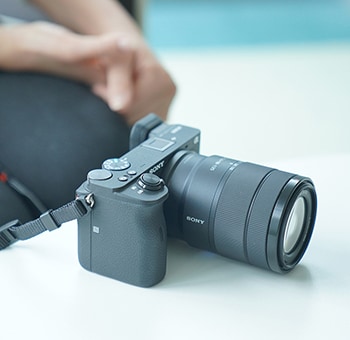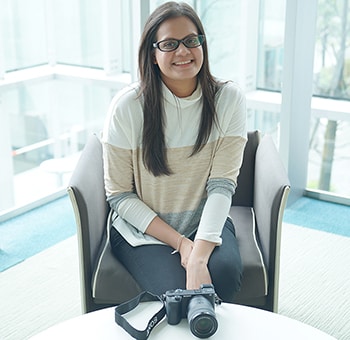PEOPLE

Beyond Language and Cultural Barriers to Reach Full Potential
in the Land of My Dreams
Rukshani Dharmapala
Sony Imaging Products & Solutions Inc
Product Design Div.1
Plucking up the courage to proceed to further education in Japan and find a job there
Japanese electrical appliances are part of our daily lives in Sri Lanka, where I was born and raised. I was particularly familiar with the Sony brand and fond of Sony radios and TVs from my childhood. I was good at scientific subjects and was very keen to study at a university in Japan, which is very strong in engineering and has extremely high technological capabilities. However, tuition fees are higher than in my home country, and since I did not want to be a burden on my parents, I gave up the idea. Around that time, I learned about the scholarship schemes offered by Japan's Ministry of Education, Culture, Sports, Science and Technology (MEXT), and decided to apply. The selection procedure was extremely strict with only 2-3 people selected out of the 60 or so people who passed the documentary screening. Fortunately, I managed to get through and came to Japan to study.
I majored in electrical engineering and did research into optical engineering. My interest in working at Sony was triggered when I took up an internship there as part of the third-year curriculum. I chose Sony out of several companies both because I had admired it since my childhood and because the internship lasted around one month, longer than the internships at other companies. I thought this would give me more time to properly observe the corporate culture and workplace atmosphere at the company. I was uneasy at first, but once I started, I found my workplace colleagues were energetic and happy in their work, creating a truly warm atmosphere. As I spoke about various things with my senior colleagues, my determination to work at Sony grew steadily stronger. While I had the option of going to graduate school after I graduated from university, I decided to seek employment at Sony because I believed it would enable me to grow through the greater experience I would gain from working there. I also thought I would become better able to contribute to the world by making the most of my capabilities.

Growing as an engineer while gaining an understanding of a different language and a different culture
After I joined the company, I was assigned to a department that designed the power sources for cameras. I hear that many Japanese companies provide new employees with one, sometimes two, years of training. At Sony, however, the training lasted only three months and we were assigned to actual workplace duties around half a year after joining the company. Seeing products in which I was involved on display in stores is hugely rewarding. Sometimes when I came across customers using cameras that I had helped create, I would be so happy that I couldn't help speaking to them. Power sources involve various parts and devices, so I find the knowledge I gained designing them useful in many ways even today.
As I joined the tea ceremony club at university, I had plenty of opportunities to come into contact with the Japanese language, so I did not find daily conversation much of a problem. Once I joined the company, however, I had communications problems because I found it difficult to understand technical terms or comprehend the fine nuances of e-mails. On one occasion, the camera I was using as part of a new employees' research theme developed a fault, and my tutor* told me to "sort it." As I was working hard to fix the fault, my tutor, who was from Kyushu, told me that in Kyushu dialect, "sort it" meant to "clear away." We both had a good laugh about that! In addition to language, I initially found Japanese business etiquette bewildering. In Japan, the order in which people board an elevator or get into a car is the complete opposite of the custom in Sri Lanka. I am pretty used to such things today, but after I entered the company, I always acted very cautiously in case I did something discourteous.
- *A tutor is a young superior colleague assigned to guide new recruits on daily routines on a man-to-man basis

Using communications stratagems to facilitate work
These days, I design antennas to be incorporated in cameras for WiFi or NFC wireless communications. It is really challenging to design antennas from scratch to meet constantly evolving wireless standards, and to explore how to make them smaller so that they can fit into the camera body efficiently. This work has made me realize just how interesting monozukuri is. On the other hand, close communications with the people in charge of mechanical design are essential. I therefore do my best to avoid any misunderstandings, using white boards for explanations and actual equipment to convey my thoughts visually. I also follow up verbal explanations with e-mails, sending illustrations and drawings to supplement the text.
Sony has adopted various initiatives targeted at non-Japanese employees. Around the time I joined the company, I joined a scheme known as the "Buddy Program" which brought Japanese and non-Japanese employees together in groups to teach each other their mother tongues. This was really helpful because we could get help when we had questions about workplace culture, emails and conversation in Japan. There are also many events that enable us to broaden our personal connections through, for example exchanging information with non-Japanese employees in other departments. These events include Sony Happy Hour organized by the Sony Group's DIVI@Sony* diversity promotion project. I am very thankful for the sympathetic environment that provides us with help to work with peace of mind through friendly support for employees who cannot speak Japanese.
- *DIVI@Sony is short for the Diversity Initiative for Value Innovation at Sony
 Ms. Dharmapala was involved in designing the wireless components for the α6600
Ms. Dharmapala was involved in designing the wireless components for the α6600Corporate culture encourages employees to speak up without prejudice, irrespective of nationality or gender
I believe that being a non-Japanese and a woman are strengths for me as an engineer. In my department, when we review newly developed technologies, we consider how we can make best use of them in camera functions. From my perspective as a non-Japanese, for example, I can suggest that young people in South Asia would be delighted with such and such a function. The very fact that I am not Japanese seems to make it easier for my colleagues to remember my face and my name, enabling me to make smoother progress with my work. Also, I'm not sure whether it is because I am a woman, but there are times when I seem better able to pay closer attention to details. Since I am in charge of checking user manuals as well as design, I verify even the smallest details carefully time and time again.
I am rather shy, so I found it difficult to express my opinions in front of others when I first joined the company. However, the corporate culture at Sony encourages employees to listen to all opinions carefully. Making proper preparations in advance has enabled me to present my opinions and ideas proactively to section and departmental managers during meetings. There are not many companies in Sri Lanka that allow people to voice their opinions to superiors. The fact that Sony provides me with equal opportunities to act and grow even though I am a non-Japanese woman is one of the great attractions of a company that values diversity.

Aspiring to become a bridge linking people with people, and countries with countries
Looking ahead, I intend to refine my skills as an engineer while acquiring leadership expertise. My initial objective is to achieve leader status with a view to reaching a managerial position someday. I feel fortunate to be working under my present boss because he has created an environment where each subordinate can work unrestrained. I aspire to become a manager who, like him, possesses wide-ranging knowledge and values human to human relationships.
I would also like to contribute more to my homeland Sri Lanka by making full use of my experience living and working in Japan. At the moment, I belong to the Sri Lanka Professionals Association in Japan. At the Association, I am involved in events designed to help develop the careers of Sri Lankans working in Japanese companies, as well as seminars relating to working in Japan held at universities in Sri Lanka. I would like to continue providing information that will be useful to young Sri Lankans by deepening their understanding of Japan. This ranges from aspects of corporate culture, such as the 5S system (sort, set in order, shine, standardize and sustain) introduced at many manufacturing gemba in Japan, to driving manners and the Japanese taxation system.
One's workplace is where one determines one's life. I would like anyone who is seeking employment to use schemes like internships not only to check whether the corporate customs and workplace atmosphere at certain companies suits them or not, but also to confirm whether they can feel secure working there even during social emergencies. Today, the COVID-19 pandemic is raging worldwide, but Sony Group companies decided to cancel overseas business trips and participation in shows well before the infection started to spread. Group companies also took care to coordinate projects to prepare for teleworking by all employees. In addition to thanking all concerned for making appropriate decisions, I would like to say how pleased I am to have been employed by a company that values people so much by putting its employees' safety first.


